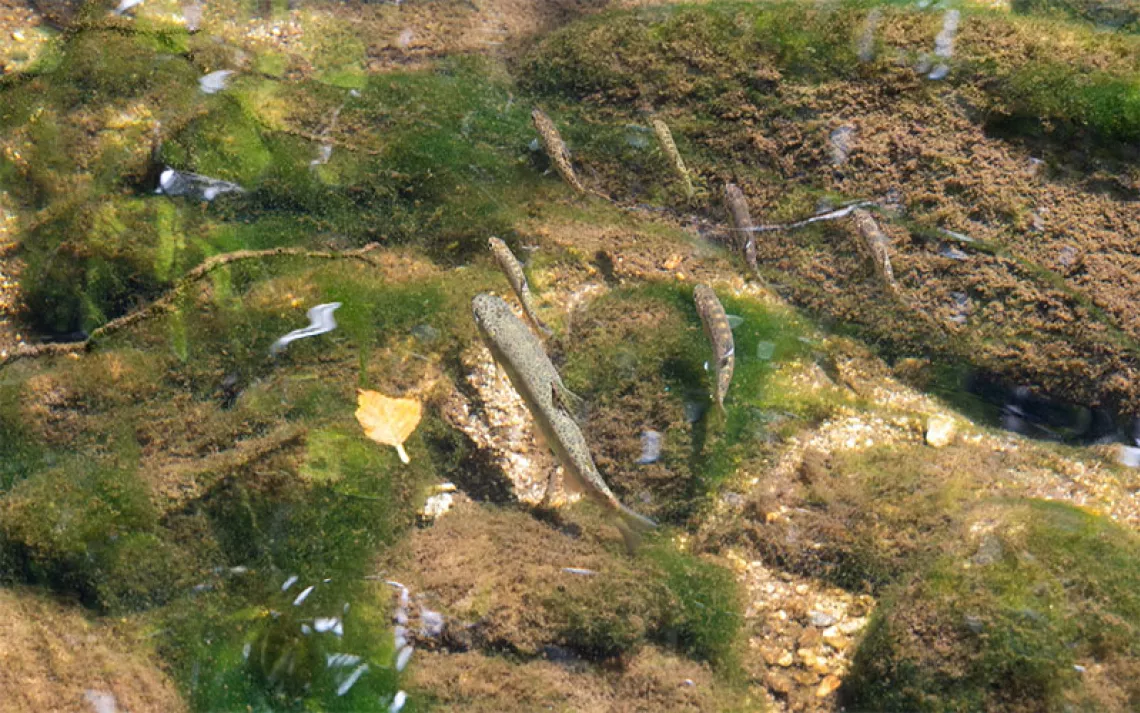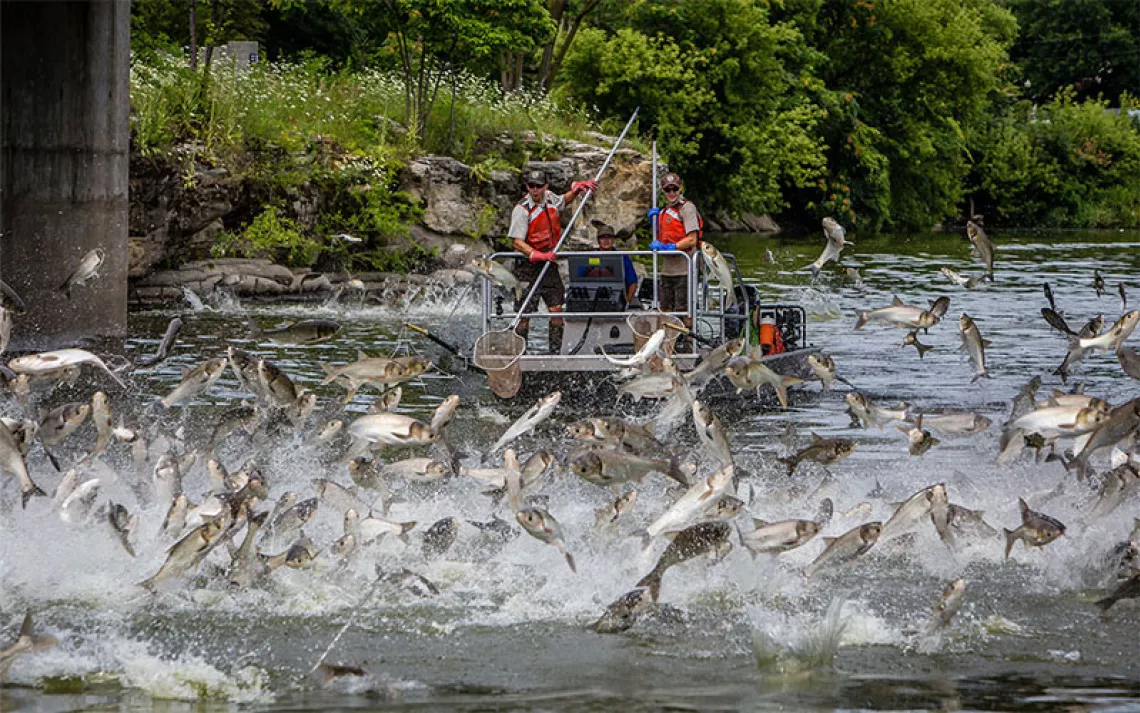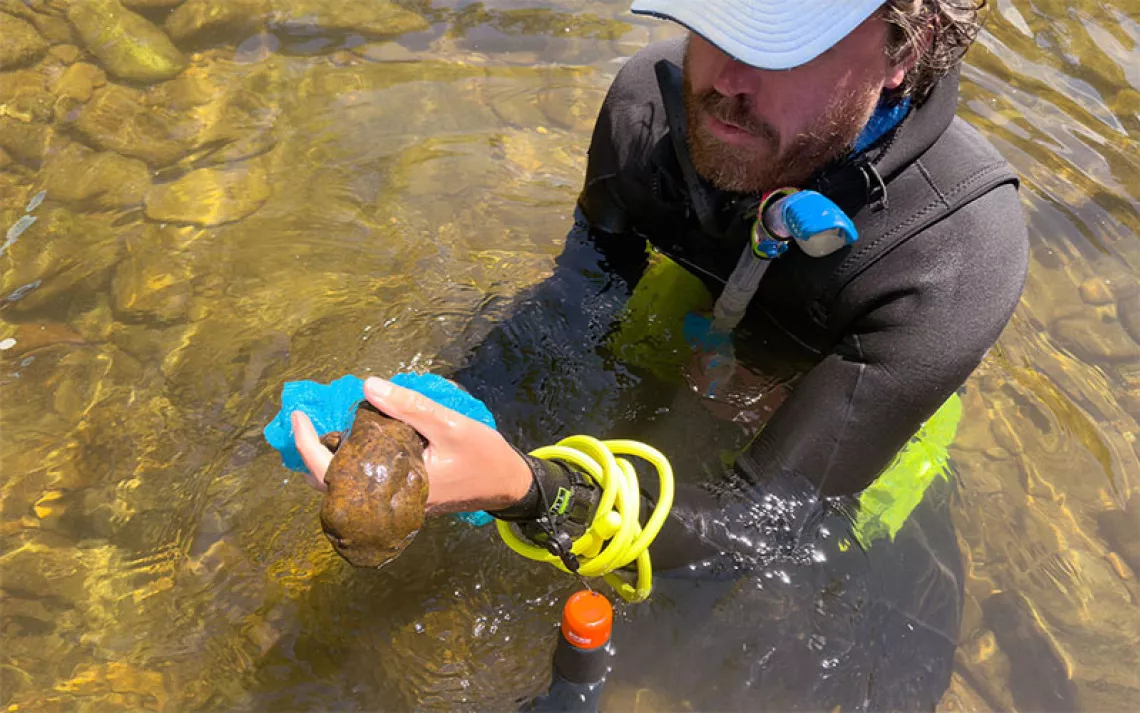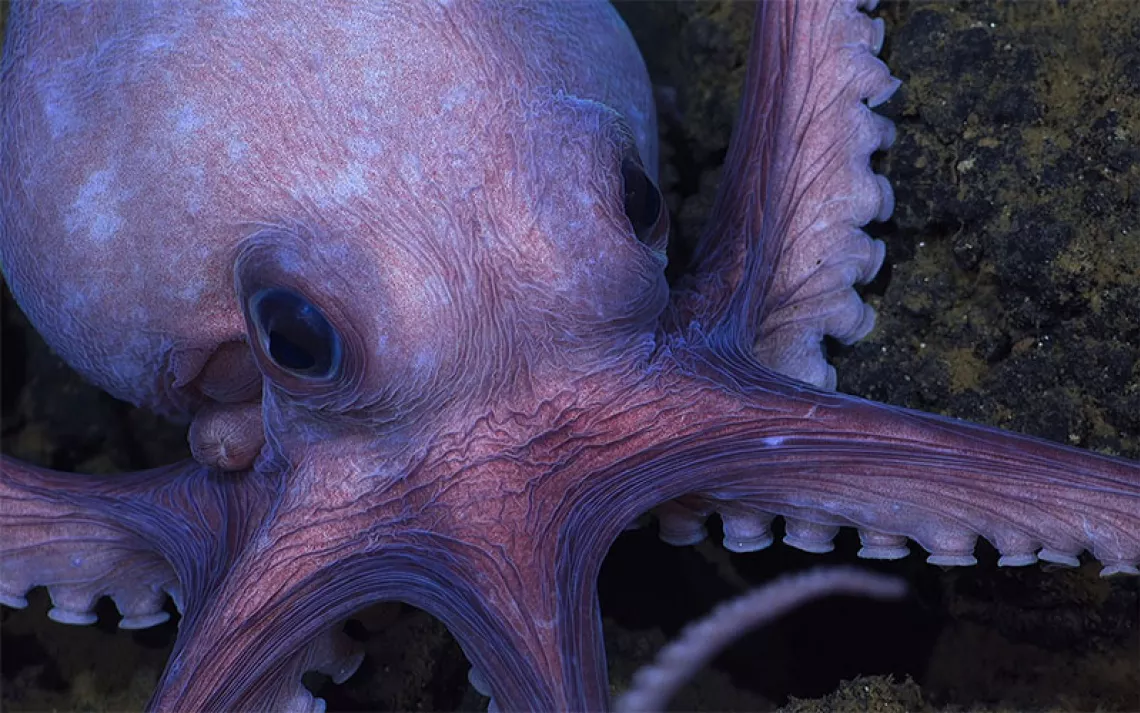Crabs’ Sense of Smell Gets Worse in Acidic Seawater
Dungeness crabs may have a harder time finding food as oceans acidify
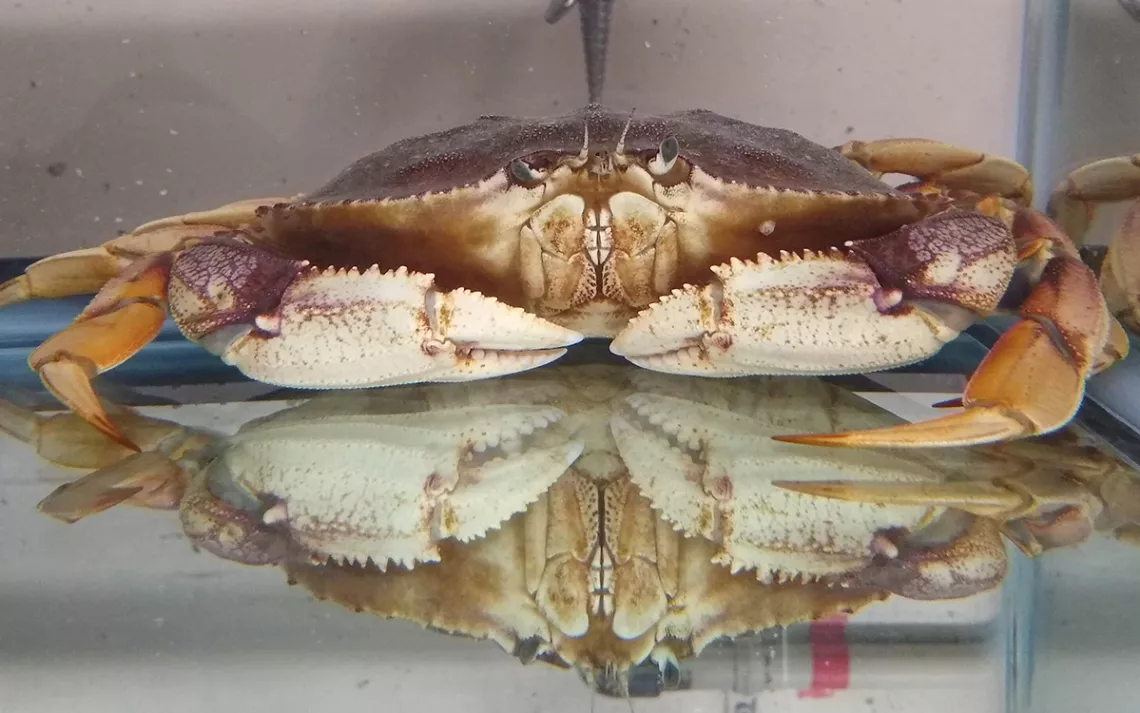
A wild-caught Dungeness crab in an animal physiology lab at the University of Toronto Scarborough. | Photo by Cosima Porteus
One of the most culturally and economically important fisheries in the Pacific Northwest doesn’t actually include any fish but rather the charismatic—and many would say delicious—Dungeness crab. “The fishery was estimated at $250 million in 2019. So it's both a source of revenue and a source of food for many people,” says Cosima Porteus, an animal physiologist at the University of Toronto Scarborough.
Porteus and two other scientists in her research group, Andrea Durant and Elissa Khodikian, have been investigating how ocean acidification due to rising CO2 levels is affecting Dungeness crabs. Acidic seawater is known to damage the exoskeletons of juvenile Dungeness crabs. But Porteus’s team was interested in the impacts on adult crabs, specifically on their sense of smell.
In a recent study published in Global Change Biology, the scientists showed that exposure to acidified seawater makes crabs worse at picking up food odors. Since crabs rely heavily on smell to find food and mates and avoid predators, this sensory impairment could lead to reduced survival and reproduction.
To test the effects of ocean acidification, the researchers took wild-caught Dungeness crabs and put them in tanks of seawater with either low-CO2 or high-CO2 air bubbled into it. The high-CO2 air bubbles acidified the seawater, simulating the effects of climate change. Currently, Dungeness crabs only experience this acidity level during coastal upwelling events, but it will become increasingly common over the next couple of decades. After a 10-day exposure period, the researchers tested the crabs’ responses to a chemical cue to see how the two groups differed. They used a chemical called cadaverine that gets released from animal tissues when they decompose and acts as a feeding cue for crabs.
To test the crabs’ sensitivity to cadaverine, the researchers measured how many times per minute the crabs flicked their antennules after the chemical was added to their tank. Antennule flicking helps crabs pick up odor compounds in the water just like we sniff with our noses to help us detect odors in the air. The crabs from the nonacidified seawater treatment ramped up their antennule flicking rate when very low concentrations of cadaverine were added to their tank. But at higher concentrations, their flicking rate stayed low. Just like sniffing, antennule flicking is mostly used to pick up faint odors. Once a smell gets strong enough, there is no need to sniff noses or flick antennules to detect it.
The crabs from the acidified seawater treatment showed the same pattern as the other crabs but at cadaverine concentrations that were 10 times higher. “With crabs that were exposed to ocean acidification,” explains Porteus, “we needed to make that smell 10 times more concentrated before they were increasing their flicking behavior, which indicated that their detection of this odorant was impaired under ocean acidification.”
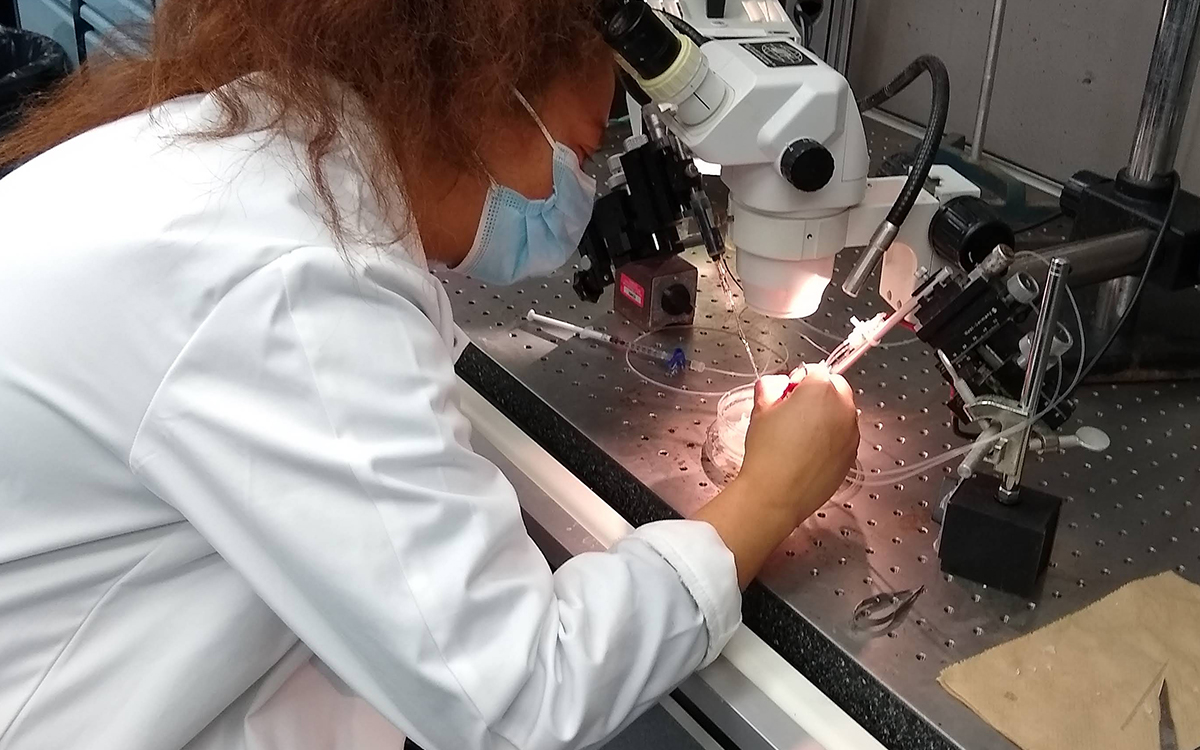
Andrea Durant conducting electrophysiology studies on crab antennules. | Photo by Cosima Porteus
The scientists also looked at what was going on inside the antennules. The antennular nerves from crabs in nonacidified seawater fired more rapidly than those from acidified seawater when exposed to a high concentration of cadaverine. And crabs exposed to acidified seawater produced less of an important olfactory protein in the neurons from their antennules. Together, these results suggest potential impacts of ocean acidification on the crab sensory system at the cellular and molecular levels.
It's still unclear whether having a diminished sense of smell means that crabs would have a harder time finding food, but Porteus hopes to answer that question next. “Some of our future work will look at how that change in detection actually affects how quickly they can find an odorant,” she says. If the crabs can’t find food as easily in more acidic water, they may have to spend more time and energy foraging, leading to slower growth and reproduction. A worse sense of smell could also make the crabs worse at avoiding predators and finding mates. But more research is still needed to verify which, if any, of these outcomes are likely to occur in wild crab populations.
Wolfgang Stein, a neurophysiologist at Illinois State University who was not involved in this study, says that bridging the gaps between an animal’s ecology and physiology is critical to understanding all the ways that ocean acidification will affect them. “As neurophysiologists,” he says, “we are a little guilty of ignoring the ecology of the animals.” But he adds, “in the last couple of years, the two fields of ecology and neurophysiology have come together a little more.”
Porteus thinks the effects that her research team documented in Dungeness crabs may also be occurring in other crustaceans. “Lobsters, other crab species, they all sense and smell the environment in a similar way,” she says, “so definitely what we're finding for Dungeness crabs could apply to other species.” There’s mounting evidence that ocean acidification impairs the sensory systems of other marine animals as well, including bony fishes, sharks, mollusks, corals, and sea urchins.
But scientists are still figuring out which animal species are most susceptible to these impacts. Chase Williams, an environmental toxicologist at the NOAA Northwest Fisheries Science Center who was not involved in the study, says that some species are likely to be much more impacted than others. “It's becoming clearer as more and more research comes out that there's definitely going to be a lot of species-specific effects,” says Williams. “Not all animals are going to respond similarly.”
Stein says that future research into the impacts of ocean acidification should also consider how acidity fluctuates over time. Climate change is not only making oceans more acidic overall but also making fluctuations in acidity more frequent and extreme. “These animals will experience more fluctuations,” says Stein, “but I think that part is completely unexplored.”
Ultimately, he says, “We are struggling because we have very little data on all of this.”
 The Magazine of The Sierra Club
The Magazine of The Sierra Club
